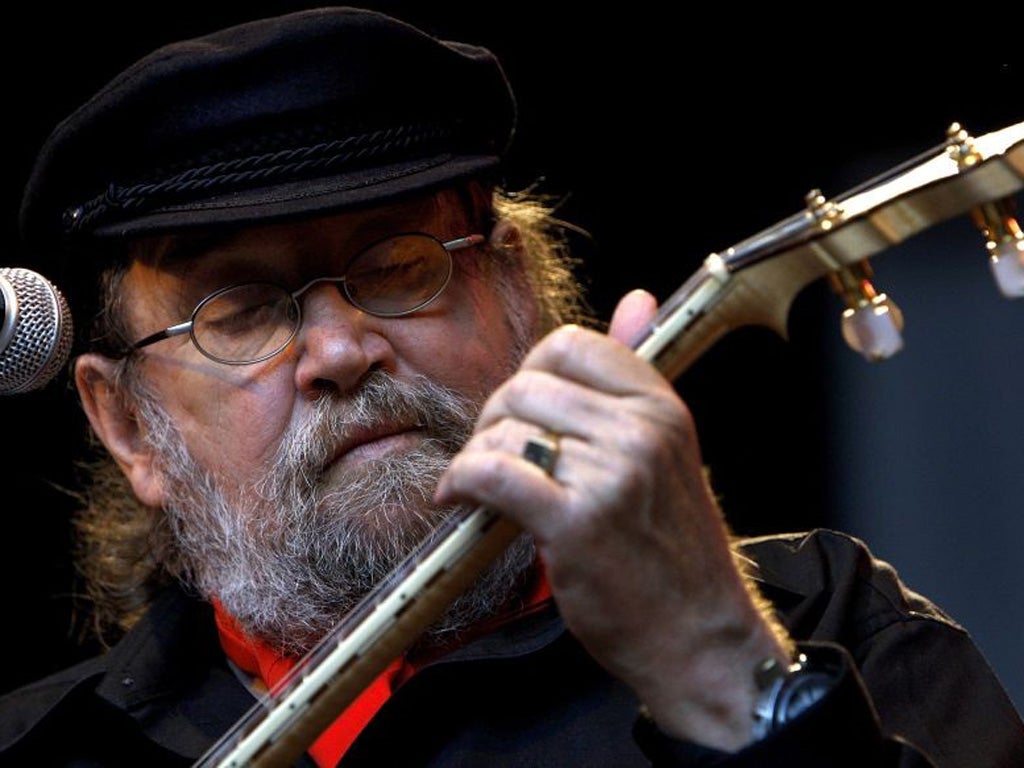Barney McKenna: Founding member of the Dubliners

When they made Barney, they broke the mould," said fiddle player John Sheahan shortly after hearing of the sudden death of Barney McKenna, his close friend and much-loved musical colleague in The Dubliners for nearly half a century.
His grief was swiftly shared with the rest of Ireland, where McKenna was a household name – a gifted musician but a modest man whose idiosyncracies and surreal use of the English language were attributed the tag "Barneyisms". With his round face, unkempt hair, wild beard and baffled expression – plus a penchant for telling tall stories and singing comedic songs – his humorous image belied an outrageous talent as one of the world's finest banjo players.
Indeed, the tenor banjo was little heard in Ireland until McKenna took it up – initially because he didn't have enough money to buy his preferred instrument, the mandolin – and his explosive style, playing traditional tunes in a manner more commonly associated with fiddle or accordion, catapulted the instrument to the forefront of Irish folk music. The Dubliners conquered the world following their rise from sessions in the snug at O'Donoghue's bar in Dublin in 1962 to international acclaim as one of the world's most famous folk groups, but Barney's greatest pride was knowing that he'd played a key role in popularising the banjo in modern folk culture.
Brought up in Donnycarney in Dublin – earning him the epithet "Banjo Barney from Donnycarney" – he was self-taught and had already been through a succession of manual jobs by the time he met Ronnie Drew. With Luke Kelly and Ciaran Bourke, they initiated the music sessions at O'Donoghue's which lay the groundwork for the lovable monster that became the Dubliners. Without any game plan, they seamlessly transferred their informal "ballads'n'booze" sessions at O'Donoghue's into a concert environment and their booming chorus songs and aggressive instrumental approach resonated with ordinary folk. It may have been formulaic, but their natural approach served the Dubs well in a 50-year career, which took off internationally following their surprise 1967 hit single, "Seven Drunken Nights", although their greatest success came two decades later when they collaborated with spiritual successors The Pogues on another hit single, "The Irish Rover".
The group was full of colourful characters and McKenna was one of its biggest, conforming to their popular image as renegade entertainers with a huge thirst. In truth, this was in part self-perpetuated and their drinking sessions were never quite as relentless as legend insisted, although McKenna stories are legion. Once he attempted to drive the group home from a gig without realising that the car was an automatic. After a succession of jolting stops, the group was arrested and spent the night in cells. Waking up, Drew is reputed to have said, "Jaysus Barney, this is a terrible hotel you've booked us into."
Singers Drew and Kelly inevitably got most of the attention, but, as the line-up changed – Drew left the band for the first of several times in 1974 while Kelly and Ciaran Bourke died in 1984 and 1987 respectively – McKenna became the group's essential heartbeat, renowned for the speed and dexterity of his playing, on mandolin and melodeon as well as banjo. He wasn't much of a singer, yet could still bring the house down with a daft comedy ditty and invested well-known material like "Fiddler's Green" and "I'm a Man You Don't Meet Every Day" with such personality that he made those songs his own.
Outside music his main passions were fishing and sailing, perhaps explaining his fondness for sea shanties, but he was happiest in the company of other musicians. As the pressures of touring took their toll, the other band members asked whether they should consider retiring. McKenna's response was, "It's too late to stop now" – a comment that became one of his catchphrases and the title of a 2006 compilation album.
He was true to his word, too, playing with less speed but still no little skill as the Dubliners embarked on a busy schedule this year to mark their 50th anniversary. In February they won a lifetime achievement award at the BBC Folk Awards and continued to entertain deep into the early hours at the after-show party. Last month they completed a triumphant UK tour, including a sell-out show at London's Royal Albert Hall and future plans included a new album and DVD, with McKenna central to it all. A born musician, he will be remembered as one of Irish music's all-time greats.
Bernard Noel "Barney" McKenna, musician: born Donnycarney, Co. Dublin 16 December 1939; died Dublin 5 April 2012.
Join our commenting forum
Join thought-provoking conversations, follow other Independent readers and see their replies
Comments
Bookmark popover
Removed from bookmarks